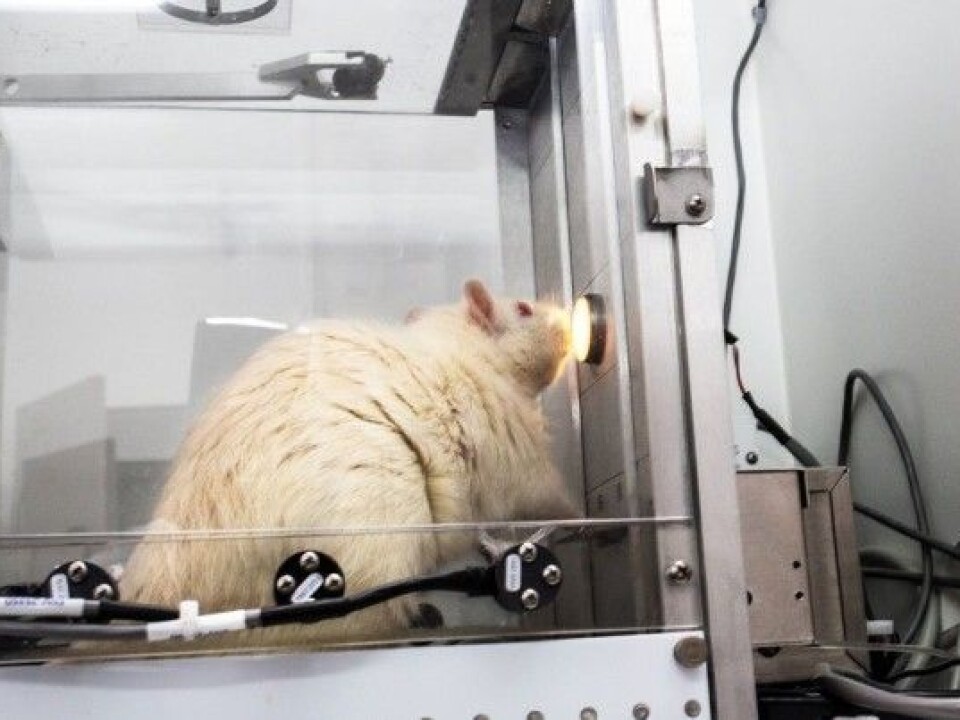
New research may explain why some people become alcoholics
Several studies suggest that a brain function related to the handling of emotions and stress may be abnormal in people who are addicted to drink.
Even when a person knows their drinking is problematic and harmful, what makes some people unable to stop?
Swedish and American researchers have conducted an experiment with rats to investigate this issue. Even when rats were given an electric shock if they pushed a pedal to be given a sip of alcohol, a small percentage of the animals continued to push the pedal.
This percentage was roughly similar to the proportion of people who become addicted to alcohol.
The study, recently published in Science, also describes some of the differences researchers found in the rats’ brains, which they believe explain some of the animals’ addictive habits. They have also found the same feature in humans.
Became self-destructive

Researchers at Linköping University taught rats to push a pedal to get a drink. The rats had two choices: alcohol or sweetened water.
The idea was to create an experimental set-up that reflected a real life situation, where people have a choice of different kinds of drinks.
Most of the rats in the experiments chose the sweetened water. However, after many years of experiments with more than 600 rats, the researchers found that roughly 15 per cent of the animals consistently chose alcohol over sweetened water — which is strikingly similar to the number in humans who become alcoholics.
Even though pushing on a pedal to administer alcohol gave the rats a painful electric shock, they continued to self-administer alcohol. The researchers compared this behaviour to the self-destructiveness that characterizes alcoholics.
"A key feature of addiction is that you know it will hurt you, maybe even kill you, and yet something has gone wrong with your motivational control and you can’t stop," said Markus Heilig, one of the researchers behind the study, in a press release from Linköping University.
Problems handling emotions?
Heilig began studying addiction in rats and mice in the mid 2000s with the aim of finding new ways to treat the disorder.
He has found many genes, molecules and regions in the brain that he believes contribute to addictive behaviour in his rats.
In his last study, he and colleagues assessed hundreds of genes in several areas of the brain. They were most interested in those found in a part of the brain called the amygdala, which is important in the processing of emotions.
The researchers found a gene in this region that was at unusually low levels. Its job is to tell a substance called the GAT-3 protein keep the amount of GABA, a signaling substance, at a low level.
If the GAT-3 protein doesn’t do its job, as in the rats that preferred alcohol, GABA increases around the nerve cells - and the nerve cells become abnormally inactive.
Heilig believe this may cause trouble for the rats in dealing with fear and stress, which helps make them more vulnerable to alcohol.
In 2017, Finnish researchers also found a connection between alcohol use and GABA in the brain. However, they interpreted changes they found in this signaling substance as a possible consequence of drinking, rather than the possible cause of it.
But the new study might make a stronger case. When the researchers manipulated GABA in some of the non-alcoholic rats, they showed some of the same differences the researchers saw in the alcoholic rats, and also began to prefer alcohol to the sweetened water.
“It had a striking effect on the behaviour of the rats,” said Eric Augier, Heilig's colleague who led the study, according to the Swedish press release.
Looking for a cure
Heilig said in an interview in The Atlantic magazine that the goal was not to cure alcoholism in rats, of course.
“What’s important is what this looks like in humans with alcohol addiction,” Heilig said in the interview.
In collaboration with American researchers from the University of Texas, the researchers went on to examine postmortem brain tissue to look at levels of GAT-3 protein, the substance that controls GABA’s levels in the brain.
In people who were known to be alcoholics, there was less GAT-3 in the amygdala area than in the brains of people who were not addicted to alcohol, according to the Science study.
"This is one of the relatively rare cases where we find an interesting change in our animal models and the same change in the brains of people with alcohol addiction," said Dayne Mayfield, one of the American researchers.
Researchers are now working with a pharmaceutical company to see if a drug can be developed to build on this finding.
-------------------------------------
Read the Norwegian version of this article at forskning.no.






